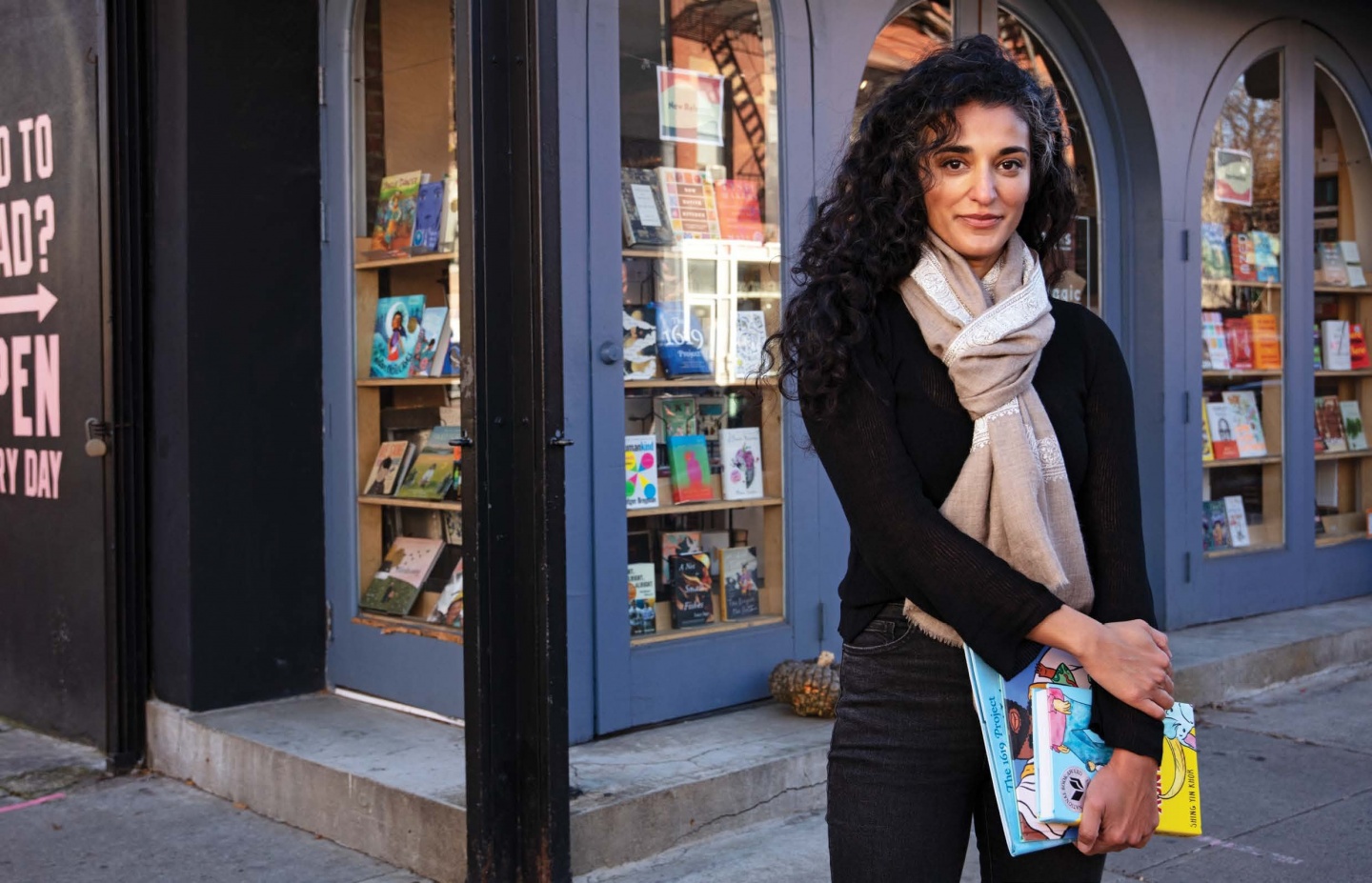Columbia College | Columbia University in the City of New York
Publisher Namrata Tripathi ’01 Is Helping Young Readers Make Sense of the World

JÖRG MEYER
When Namrata Tripathi ’01’s daughter was 4, she came home from the library and asked, “Mama, am I white?” The moment stuck with Tripathi. “I felt like I had failed my kid,” she recalls. “I had raised her to be aware of her Indian heritage, but I realized I had not been explicit enough about race. So she had to go into the world without the language to talk about it.” A few years later, Tripathi realized she could help other young children and their caregivers begin these challenging conversations.
In 2018, after more than 15 years working in the publishing industry, Tripathi founded Kokila, an imprint for young readers from Penguin Random House. One of her first decisions as publisher was to approach Ibram X. Kendi, author of the bestselling How to Be an Antiracist, about writing a board book for kids 3 and under; a few months later, Antiracist Baby was born. “If you claim to be color-blind, you deny what’s in front of you,” the book reads, alongside adorable drawings of babies. “We believe this conversation is appropriate and worth having, even with the youngest members of our society,” says Tripathi. “This book gives parents a script.”
In just two years, Tripathi has transformed Kokila into a powerhouse. Her team of seven has already produced two New York Times bestsellers (Hair Love and Antiracist Baby), a Newbery Honor winner (The Night Diary) and two National Book Award finalists (The Legend of Auntie Po and Patron Saints of Nothing). For Tripathi, creating a space to tell complex stories that help young people make sense of the world — and their place in it — is the most fulfilling work of her career.
Thanks to her parents’ jobs as diplomats, Tripathi had a nomadic childhood, living in Afghanistan, India, Pakistan, Canada, Germany and Poland. She arrived in New York in 1997 to attend the College, where she studied English and considered pursuing a career in academia. When she asked Professor James Shapiro ’77 and now-University Professor Gayatri Spivak for guidance, they suggested she take a gap year to explore other career paths. Tripathi followed their advice. In 2001 she took the Columbia Publishing Course, a six-week introduction to the book industry, and then landed a job as an editorial assistant at HarperCollins Children’s Books. The work instantly resonated with her. “Children’s books serve an essential purpose,” she says. “In a picture book, a child is exposed to language, literature and ne art for the first time. It’s like a primer on how to be a human.”
For more than a decade, Tripathi explored many corners of young adult literature, editing everything from mass market books to award winners like John Corey Whaley’s Where Things Come Back. But she also observed how representation in children’s books could miss the mark. “It would often be well-intentioned storytelling for white readers,” she says. “There might be a white savior trope embedded in it, or a ‘celebration’ of culture that was very othering.”
Four years ago, Penguin Random House approached Tripathi about being a publisher for one of its existing imprints; she came back to them with the idea for Kokila, which she had been dreaming about for most of her career. In her pitch, Tripathi told the head of the children’s division that she was interested in doing more than just increasing representation; she wanted to create a space where top-notch writers, editors and art directors from diverse backgrounds would have a chance to do their best work. “I loved the idea of having the largest publisher in the world supporting this mission,” she says. “Our scrappy group could exert influence on the House and on the industry. We could punch above our weight.” Tripathi got the job.
Kokila has already made a name for itself with its nuanced, layered storytelling. The acclaimed My Papi Has a Motorcycle, for example, is about a father and daughter riding around town on a motorbike. But on a deeper level, the book is about gentrification — the girl’s grandfather once worked in citrus groves in the area, but the lemon trees have been replaced by subdivisions. Her father is a contractor building those very houses, which they will never be able to afford. Still, the book ends on an optimistic note, with the father promising to take his daughter for another ride tomorrow. “In some ways, My Papi is about how a child recognizes that nothing is constant,” Tripathi says. “But if you’re lucky, the love of your family will carry you through change.”
With Kokila, Tripathi has created a place where storytellers don’t need to justify their identities or points of view. Instead, they tell the stories that are meaningful to them and invite the reader along for the ride.
Elizabeth Segran ’05 is a senior staff writer at Fast Company and the author of The Rocket Years: How Your Twenties Launch the Rest of Your Life. She lives in Boston with her CC’05 husband, whom she met freshman year; daughter; and books.
Issue Contents
Published three times a year by Columbia College for alumni, students, faculty, parents and friends.
Columbia Alumni Center
622 W. 113th St., MC 4530, 6th Fl.
New York, NY 10025
212-851-7852
cct@columbia.edu
Columbia Alumni Center
622 W. 113th St., MC 4530, 4th Fl.
New York, NY 10025
212-851-7488
ccalumni@columbia.edu

